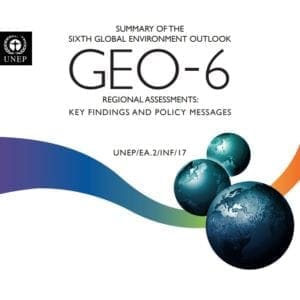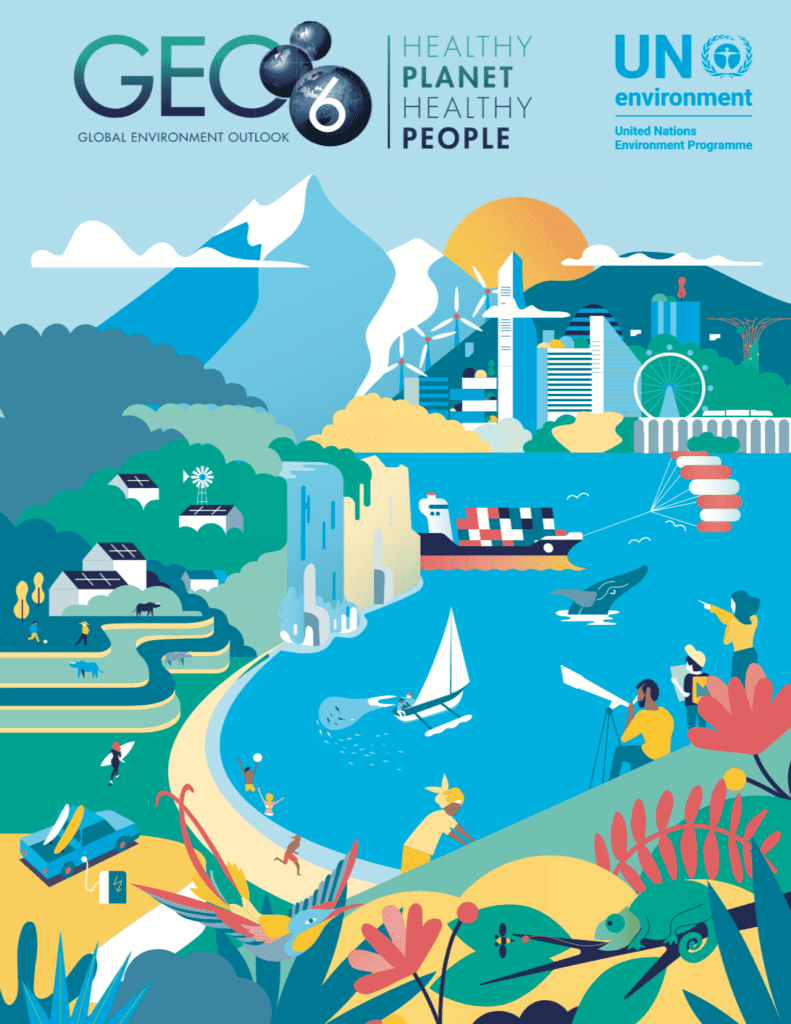 By Sr. Catherine Prendergast with information from UN Environment Program
By Sr. Catherine Prendergast with information from UN Environment Program
The “take, make, and waste” linear economy must shift to a more circular model, which focuses on zero waste, if the world is to avert dire damage to the planet and health crises, according to a state of the environment report issued this month by the United Nations Environment Program. The report was released as 5,000 people gathered in Nairobi, March 11-15, for the Fourth United Nations Environmental Assembly. Twenty-six resolutions resulted from the Assembly.
The sixth Global Environmental Outlook (2019) outlines the environment’s condition, highlights possible future trends, and reviews the effectiveness of policies. It also makes recommendations for a healthier and more sustainable environment. Simply stepping up recycling efforts is insufficient. Systemic change in the way we produce and consume, as well as innovative practices, technology, and policies are needed.
LINKS
To access the report, click here.
Regional Reports are available at this link.
An interactive report can be found here at this link.
WHAT IS A CIRCULAR ECONOMY?
A circular economy looks at growth from the perspective of benefits to society rather than financial gain. It would protect finite resources by concentrating on eliminating waste and pollution, keeping production to a minimum, and returning as many materials as possible to the system. It would also include transition to renewable energy.
 REPORT CALLS FOR ACTION NOW
REPORT CALLS FOR ACTION NOW
The report basically triggers the alarm that NOW is the time to act. Unsustainable production and consumption patterns and trends, and inequality, combined with seemingly insatiable resource use are deteriorating planetary health at unprecedented rates, with increasingly serious consequences for poor regions and persons living in poverty, it indicates. The report also reveals that the world is not on track to achieve environment-related Sustainable Development Goals by 2030.
The signs are clear that Earth cannot sustain continuous degradation and voracious resource consumption. It is evident in a reduction of fish populations, dried waterways, thawing permafrost, deforestation, pollution, the shocking volume of plastic in oceans, habitat loss, significant droughts and floods, and more. In the Paris Agreement, world leaders agreed to keep global warming below two degrees Celsius compared to pre-industrial levels, by the end of this century. But we are headed towards 3.3 degrees Celsius, according to Climate Action Tracker, and global emissions have risen. So much more needs to be done.
Earth is assaulted by marine pollution, air pollution (which is the cause of 6 to 7 million premature deaths annually), land degradation, biodiversity loss, overexploitation of land, various additional forms of pollution, invasive species, illegal wildlife trade, and climate change among other factors.
RECOMMENDATIONS
Recommendations for turning things around include eating less meat and reducing food waste (33 percent of global edible food is wasted), investment in rural areas, and urgent action on climate change. Other ideas for environmental preservation include improved governance, land-use planning, managing waste, green infrastructure, and significantly reducing the 8 million tons of plastic which wend their way into oceans annually. The report also calls for harnessing technology and using a systemic policy approach.
CONSEQUENCES OF TAKING NO CORRECTIVE STEPS
Failing to take action could lead to millions of premature deaths by 2050 in cities or regions of Asia, Africa, and the Middle East. In addition, pollutants in waterways could cause anti-microbial resistance to become a major cause of death, endocrine disruption could impact fertility, and child neuro-development could be affected.
“WE ARE AT A CROSSROADS”
“The science is clear. The health and prosperity of humanity is directly tied with the state of our environment,” said Joyce Msuya, Acting Executive Director of UN Environment. “This report is an outlook for humanity. We are at a crossroads. Do we continue on our current path, which will lead to a bleak future for humankind, or do we pivot to a more sustainable development pathway? That is the choice our political leaders must make, now.”








0 Comments